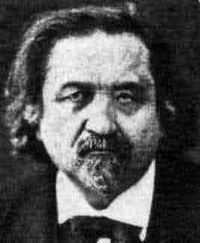 A prominent French mathematician, Joseph Bertrand studied and taught at the École Polytéchnique in Paris. From 1862 to 1900, he held a chair at the prestigious Collège de France. He was also a member of the influential Académie des Sciences.
A prominent French mathematician, Joseph Bertrand studied and taught at the École Polytéchnique in Paris. From 1862 to 1900, he held a chair at the prestigious Collège de France. He was also a member of the influential Académie des Sciences.
For philosophical reasons, Joseph Bertrand was generally opposed to the application of mathematical reasoning to psychology, sensations, and other elusive components of human behavior. As a result, he was very dismissive Leon Walras’s pretentious claim that economics was merely a branch of applied mathematics. As he put it once to Walras, it was like ‘undertaking the study of hydraulics with muddy liquids’.
In 1875, as a referee for the Revue des Deux Mondes, Bertrand rejected a Walras paper (later published in the Giornale) on this topic.
In 1877, Walras sent Bertrand a draft of his Théorie mathématique de la richesse sociale, but Bertrand did not reply.
In 1883, Bertrand finally decided to publish a review of Walras’s book in the Journal des Savants. Although negative in general, Bertrand’s review had some kind words for Walras. Bertrand disputed the realism of the tâtonnement process and argued that out-of-equilibrium exchange must be allowed and thus price indeterminacy. He also disputed the utility-maximization hypothesis, arguing that merchants were mainly interested in money profits, not utility.
In that same 1883 Journal des Savant article, Bertrand took the opportunity to also review the long-neglected 1838 work of Augustin Cournot. Here, Bertrand’s assessment was damning. He argued that Cournot’s work deserved to be neglected because its algebraic argument was faulty and that, as a result, Cournot had reached the wrong conclusions on questions like the incidence of tax on monopoly price, the determinacy of duopoly price and the effects of free trade.
On the constructive side, Bertrand (1883) ‘reworked’ the Cournot duopoly model with prices, rather than quantities, as the strategic variables. In this case, Bertrand showed, prices will be driven immediately down to the perfectly competitive solution. Later on, Francis Y. Edgeworth (1897) drew attention to the limitations of Bertrand’s solution, in particular that he relied on firms having no capacity constraints and thus operating under constant marginal cost. In its stead, Edgeworth introduced capacity constraints and showed that the solution was indeterminate.
Major works of Joseph L.F. Bertrand
– Traité élémentaire d’algèbre, 1851
– Traité de calcul différentiel et de calcul intégral, 1864-70
– Rapport sur les progrès les plus récents de l’analyse mathématique, 1867
– Théorie des Richesses: revue de Théories mathématiques de la richesse sociale par Léon Walras et Recherches sur les principes mathématiques de la théorie des richesses par Augustin Cournot, 1883, Journal des Savants
– Thermodynamique, 1887
– Leçons sur la théorie mathématique de l’électricité, 1890
– Eloges Academiques, 1902

Thought I would comment and say awesome theme, did you create it yourself? Looks superb!
I went over this internet site and I conceive you have a lot of superb information, bookmarked (:
I don’t even know how I ended up here, but I thought this post was good. I do not know who you are but certainly you’re going to a famous blogger if you aren’t already 😉 Cheers!
This is such a fantastic resource that youre offering and also you give it absent free of charge. I adore seeing web websites that comprehend the value of providing a quality resource free of charge. It?s the outdated what goes about arrives around routine.
The article has really peaks my interest. I am going to like your site and preserve checking for brand spanking new information from feed RSS :-).
I admire your blog , it has of lot of information. You just got one perennial visitor of this blog!
Thank you for giving this particular fantastic written content on your site. I noticed it on the internet. I will check back again after you publish much more aricles.